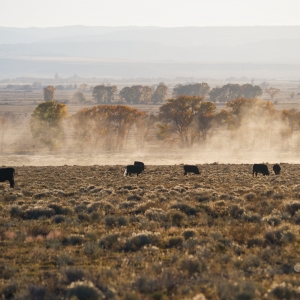Federal Water Tap, March 13: EPA Proposes Stronger Wastewater Rules for Coal-Fired Power Plants
The Rundown
- EPA rules target three waste streams from coal-fired power plants.
- President Biden’s budget proposal would increase EPA funding and allow energy bill assistance funds to be used for water bill assistance.
- The U.S. Fish and Wildlife Service lists two freshwater mussel species as threatened.
- NOAA measurements of ocean surface temperatures indicate that La Niña is gone.
- The Bureau of Reclamation prepares $250 million to pay Colorado River water users not to use water.
- Great Lakes lawmakers ask President Biden to raise the lakes’ importance during a Canadian trip.
- The House passes a resolution to reject the Biden administration’s Clean Water Act definition.
And lastly, the EPA’s draft rules for PFAS in drinking water could come at any moment.
“So, one of the aspects of water policy that I also think is very important is it really does highlight the interconnection and interdependence between us all regardless of geographic borders…And to the extent that we fully embrace that point, I think we will be smarter with policy and resources — and understand the importance of collaboration.” — Vice President Kamala Harris, speaking about water and climate on March 6 in Arvada, Colorado.
By the Numbers
$12 Billion: Funding proposed for the U.S. Environmental Protection Agency in President Biden’s fiscal year 2024 budget. It would represent 19 percent increase from current funding and includes substantial increases for water infrastructure. Congress, however, controls the purse and will determine the budget.
2: Number of freshwater mussels (longsolid and round hickorynut) listed as threatened by the U.S. Fish and Wildlife Service. The mussels have critical habitat in the Cumberland, Ohio, and Tennessee rivers. The round hickorynut is also found in the lower Mississippi and Great Lakes basins.
$250 Million: Funding that the Bureau of Reclamation is finalizing to bolster water levels in Lake Mead. The Arizona Republic reports that water users, largely farmers, will be paid not to take delivery of water. The foregone water could boost Mead by 10 feet this year, Reclamation claims.
News Briefs
Power Plant Wastewater
The EPA proposed stricter water pollution limits for coal-fired power plants, targeting three waste streams that can foul waterways with toxic heavy metals.
The action revises rules that were put in place during the Obama and Trump administrations or vacated by court ruling.
The rules would employ new zero-discharge technology to control pollution from flue gas desulfurization and bottom ash. Units that intend to shut down by 2028 would be exempt from the new rules. Facilities that have already complied with previous rules and will close by 2032 are also exempt.
The agency is also seeking comment on whether it should develop stricter rules for “legacy” wastewater that is stored on-site in ponds.
Online public hearings will be held on April 20 and 25. Submit other comments via www.regulations.gov using docket number EPA-HQ-OW-2009-0819.
Clean Water Act Squabbles
The House passed a resolution that would use the Congressional Review Act to undo the Biden administration’s new rules on which waterways are protected by the Clean Water Act.
The Senate will take up the resolution next week. But it is unlikely that the president will sign it.
Budget Items
The president’s budget proposes an $111 million increase to LIHEAP, the energy bill assistance program for low-income households.
A similar program for water bills expires at the end of 2023. The budget proposes allowing states to use a portion of their LIHEAP funds for water bill assistance.
Studies and Reports
La Niña Is Gone
NOAA’s latest ocean temperature measurements indicate that the surface waters of the tropical Pacific have warmed to the point that La Niña conditions are no longer present.
The ocean is now in a neutral phase, but a warmer El Niño pattern could emerge by the fall. El Niño is associated with warmer winters in southern Asia, drier weather in Australia and Central America, and wetter conditions in the Gulf Coast.
PFBS Review
The EPA’s internal watchdog will investigate the agency’s toxicity assessment of the chemical PFBS, which is part of the PFAS family.
The intent is to determine whether two offices involved in the assessment — the Office of Research and Development and the Office of Chemical Safety and Pollution Prevention — followed proper procedures.
On the Radar
Waiting on PFAS Rules
The EPA’s draft regulations for the chemicals PFOA and PFOS in drinking water have cleared a final procedural hurdle.
The Office of Management and Budget completed its review of the rule on March 3.
Senate Drinking Water Hearing
On March 15, the Senate Committee on Environment and Public Works will hold a hearing to discuss the drinking water and wastewater provisions in the Infrastructure Investment and Jobs Act.
President Biden’s Canadian Trip
The president is traveling to Ottawa later this month, and Great Lakes lawmakers want him to remember their homewaters.
More specifically, they asked the president, in a letter, to convey to Prime Minister Justin Trudeau the importance of committing federal funds to clean up toxic sites, ward off invasive species, restore habitat, and prevent harmful algal blooms.
Federal Water Tap is a weekly digest spotting trends in U.S. government water policy. To get more water news, follow Circle of Blue on Twitter and sign up for our newsletter.
Brett writes about agriculture, energy, infrastructure, and the politics and economics of water in the United States. He also writes the Federal Water Tap, Circle of Blue’s weekly digest of U.S. government water news. He is the winner of two Society of Environmental Journalists reporting awards, one of the top honors in American environmental journalism: first place for explanatory reporting for a series on septic system pollution in the United States(2016) and third place for beat reporting in a small market (2014). He received the Sierra Club’s Distinguished Service Award in 2018. Brett lives in Seattle, where he hikes the mountains and bakes pies. Contact Brett Walton






Leave a Reply
Want to join the discussion?Feel free to contribute!